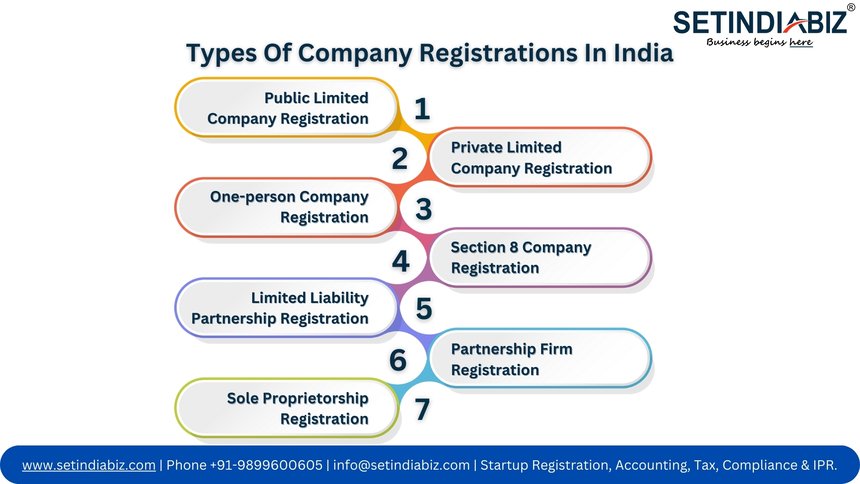This blog explains the process of 7 types of company registrations in India viz, Public Limited Companies, Private Limited Companies, One Person Companies, Partnership Firms, Limited Liability Partnerships, Sole Proprietorships, and Section 8 Companies.
Types Of Company Registrations In India

Type 1: Public Limited Company Registration
Minimum Requirements:
- Minimum 7 shareholders
- Minimum 3 Directors, at least one must be resident Indian
- An ROC approved Name for the Company
- DIN of all directors
- DSC of all promoters
- Registered Office of the Company
Documents Required:
- Promoter’s Documents: Passport-size coloured photographs, PAN, Aadhar, Identity Proof, Address Proof
- Registered Office Documents: Proof of Registered Office Address, No Objection Certificate from Office Premises owner
- Legal Documents: Memorandum of Association, Articles of Association
Stepwise Process:
- Acquire DSC and DIN of all Promoters
- Visit the MCA Website, Login to your account, and access the SPICe Plus / INC 32 Form
- File PART A of SPICE Plus for name approval of the Company to the ROC
- Within 20 days of name approval, file PART B of SPICe Plus for company registration
- Get Company Registration Certificate within 2 weeks
Type 2: Private Limited Company Registration
Minimum Requirements:
- Minimum 2 shareholders
- Minimum 2 Directors, at least one must be Indian Resident Indian
- An ROC approved Name for the Company
- DIN of all directors
- DSC of all promoters
- Registered Office of the Company
Documents Required:
- Promoter’s Documents: Passport-size coloured photographs, PAN, Aadhar, Identity Proof, Address Proof
- Registered Office Documents: Proof of Registered Office Address, No Objection Certificate from Office Premises owner
- Legal Documents: Memorandum of Association, Articles of Association
Stepwise Process:
- Acquire DSC and DIN of all Promoters
- Visit the MCA Website, Login to your account, and access the SPICe Plus / INC 32 Form
- File PART A of SPICE Plus for name approval of the Company to the ROC
- Within 20 days of name approval, file PART B of SPICe Plus for company registration
- Get Company Registration Certificate within 2 weeks
Type 3: One-person Company Registration
Minimum Requirements:
- One Shareholder who is an Indian Citizen
- At least One Director who is a Resident Indian
- An ROC approved name for the company
- A Registered Office for the company
- DIN & DSC of all directors
- One Nominee, to replace the shareholder in the event of permanent departure
Documents Required:
- Promoter’s Documents: Passport-size coloured photographs, PAN, Aadhar, Identity Proof, Address Proof
- Nominee Documents: Details of the Nominee, Nominee Consent Form INC 3
- Registered Office Documents: Proof of Registered Office Address, No Objection Certificate from Office Premises owner
- Legal Documents: Memorandum of Association, Articles of Association
Stepwise Process:
- Acquire DSC and DIN of all Promoters
- Visit the MCA Website, Login to your account, and access the SPICe Plus / INC 32 Form
- File PART A of SPICE Plus for name approval of the OPC to the ROC
- Within 20 days of name approval, file PART B of SPICe Plus for OPC registration
- Get OPC Registration Certificate within 2 weeks.
Type 4: Section 8 Company Registration
Documents Required for Section 8 Company License from Central Government:
- Form INC-12
- e-MoA in Form INC 13
- e-AoA in Form INC 14
- Declaration forms 14 and 15
- Estimated income and expenditure for the next 3 years
- Approval/NOC from the concerned authority, the sectoral regulator in the Central or State Government
- Copy of Resolution passed by the board in a general meeting
- Financial statements, board reports and audit reports of past 1-2 years
- Assets and liabilities statement of the company from the RoC.
Other Types of Business Registrations in India
Type 5: Limited Liability Partnership Registration
Minimum Requirements:
- Minimum 2 Partners
- Minimum 2 Designated Partners, at least one must be Resident Indian
- An ROC Approved Name for the LLP
- A Registered Office
- DPIN of all Designated Partners
- DSC of all Partners
Documents Required:
- Photographs, Proof of Identity and Address of all Partners
- PAN cards of all partners
- Passport of the partner, if he is a foreigner
- Proof of address of the Registered Office
- No Objection Certificate from the owner of the Office property
- LLP Agreement, needs to be filed within 30 days after LLP Registration
Stepwise Process:
- Acquire DSC of all Partners and DPIN of all Designated Partners
- Apply for name approval of the LLP in the RUN-LLP Form
- After the name gets approved, visit the MCA Website, login to your account and access the FiLLiP form for LLP registration
- Fill out the Registration Form, Upload all the documents and attach DSC of the authorized designated partner to submit the form.
- Get LLP Registration Certificate within 2 weeks
- Submit LLP Agreement to the ROC in Form 3 within 30 days from Registration
Type 6: Partnership Firm Registration
Minimum Requirements:
- Minimum 2 partners
- A valid and available name for the Firm
- A Registered Office
- A Stamped and Notarised Partnership Deed signed by all partners
Documents Required:
- Application Form-1
- PAN Cards and ID proofs of all partners
- Address proofs of all partners
- Proof of address of the registered office
- If the property is rented, a stamped and notarised rental agreement
- No objection certificate from the owner of the registered office property
- Stamped and Notarized Partnership deed
- An affidavit declaring that all details mentioned in the application are true.
Stepwise Process:
Type 7: Sole Proprietorship Registration
Documents Required:
- PAN card of the proprietor
- Proof of Identity of the proprietor
- Proof of Address of the place of business
Registering your company can be expensive and tedious assuming that you lack the expertise, experience, and knowledge of the necessary procedures. Hopefully, our attempt in this blog to give you a brief information about the procedures of different types of company registrations in India can be of some help.
You can approach SetIndiaBiz for detailed guidance and thorough assistance in any type of company/firm registration in India. Setindiabiz has been involved in providing almost all types of company registration in India services for years to clients from all backgrounds. Our each type of company registration services are fast, inexpensive, credible, and reliable in terms of quality. If you own a startup and are looking for any type of company registration or firm registration services, do check out our services!


I was bit confused in types of companies, but after reading your post, all my doubt cleared. May be there are more types of companies but you have added 7 types that are more important.